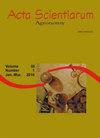A novel fuzzy approach to identify the phenotypic adaptability of common bean lines
IF 1.2
4区 农林科学
Q3 AGRONOMY
引用次数: 0
Abstract
The genotype by environment interaction is the main factor that influences the response of evaluated genotypes in trials of value for cultivation and use. Adaptability and stability analyses are fundamental to understanding the performance of genotypes in a growing region. Some of these methodologies incorporate previous information for recommending an extra group of genotypes denominated as specific ideotypes under certain cultivation conditions. Based on this strategy, the centroid method and its modifications have been widely used due to the simplicity of classification of the evaluated genotypes. However, these methodologies present problems in identifying adaptability patterns of some genotypes. Artificial intelligence techniques, such as fuzzy C-means, can be an alternative to reduce these difficulties, since they use, in addition to distance information between genotypes, memberships (measures quantifying how much an observation belongs to a particular class) to increase discriminatory power. Therefore, our aim was to propose and evaluate the phenotypic adaptability method by fuzzy clustering to assist cultivar recommendations. The adaptation of the fuzzy C-Means method to classify the genotypes was implemented in BioFuzzy software. The grain yield data of black common bean genotypes were used to evaluate the potential of the method. The results obtained by this method were compared with those obtained by the centroid method. The phenotypic adaptability method by fuzzy clustering was effective in identifying the adaptability patterns of common bean genotypes. Moreover, the discriminatory power was higher than that observed with the centroid method.一种鉴定普通豆系表型适应性的新模糊方法
在栽培利用价值试验中,环境互作基因型是影响评价基因型反应的主要因素。适应性和稳定性分析是了解一个种植区基因型表现的基础。其中一些方法结合了以前的信息,在某些培养条件下推荐一组额外的基因型,称为特定的意识型。在此基础上,质心法及其改进方法因其对所评价基因型的分类简便而得到广泛应用。然而,这些方法在确定某些基因型的适应性模式方面存在问题。人工智能技术,如模糊c均值,可以成为减少这些困难的另一种选择,因为它们除了使用基因型之间的距离信息外,还使用隶属度(量化观察结果属于特定类别的程度的措施)来增加歧视性。因此,我们的目的是提出并评价模糊聚类的表型适应性方法,以辅助品种推荐。在BioFuzzy软件中应用模糊c均值法对基因型进行分类。利用黑豆基因型的籽粒产量资料,对该方法的潜力进行了评价。并与质心法进行了比较。采用模糊聚类的表型适应性方法对普通豆基因型的适应性模式进行识别是有效的。与质心法相比,该方法的判别能力更高。
本文章由计算机程序翻译,如有差异,请以英文原文为准。
求助全文
约1分钟内获得全文
求助全文
来源期刊

Acta Scientiarum. Agronomy.
Agricultural and Biological Sciences-Agronomy and Crop Science
CiteScore
2.40
自引率
0.00%
发文量
45
审稿时长
>12 weeks
期刊介绍:
The journal publishes original articles in all areas of Agronomy, including soil sciences, agricultural entomology, soil fertility and manuring, soil physics, physiology of cultivated plants, phytopathology, phyto-health, phytotechny, genesis, morphology and soil classification, management and conservation of soil, integrated management of plant pests, vegetal improvement, agricultural microbiology, agricultural parasitology, production and processing of seeds.
 求助内容:
求助内容: 应助结果提醒方式:
应助结果提醒方式:


